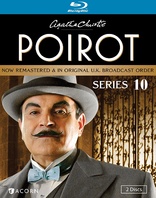Poirot: Series 10 Blu-ray Movie
HomePoirot: Series 10 Blu-ray Movie 
Acorn Media | 2006 | 388 min | Not rated | Nov 26, 2013Movie rating
8.3 | / 10 |
Blu-ray rating
| Users | 0.0 | |
| Reviewer | 4.5 | |
| Overall | 4.5 |
Overview
Poirot: Series 10 (2006)
The Mystery of the Blue Train / Cards on the Table / After the Funeral / Taken at the Flood
Starring: David Suchet, Hugh Fraser (I), Philip Jackson (II), Pauline Moran, David YellandDirector: Edward Bennett (I), Andrew Grieve, Renny Rye, Brian Farnham
| Period | Uncertain |
| Mystery | Uncertain |
| Crime | Uncertain |
| Drama | Uncertain |
| Thriller | Uncertain |
Specifications
Video
Video codec: MPEG-4 AVC
Video resolution: 1080p
Aspect ratio: 1.78:1
Original aspect ratio: 1.78:1, 1.33:1
Audio
English: DTS-HD Master Audio 2.0
Subtitles
English SDH
Discs
50GB Blu-ray Disc
Two-disc set (2 BDs)
Packaging
Slipcover in original pressing
Playback
Region A (locked)
Review
Rating summary
| Movie | 4.5 | |
| Video | 4.0 | |
| Audio | 4.0 | |
| Extras | 2.5 | |
| Overall | 4.5 |
Poirot: Series 10 Blu-ray Movie Review
"They lied very well. They are all performers."
Reviewed by Michael Reuben December 13, 2013Almost another two years passed after Series 9 concluded with The Hollow before Poirot once again met his public on New Year's Day 2006 with The Mystery of the Blue Train, a particularly elaborate and star-studded production shot in both England and the south of France. The lines of aging were beginning to show in actor David Suchet's face, although his performance had lost none of its vigor, and an obvious decision was made to let those same lines show through Poirot's paint and powder. Even though the famous detective had found retirement impossible (in The Murder of Roger Ackroyd), his constant engagement with the blackest of human motives continued to take its toll, and his uncompromising morality has exacted a cost. "The journey of life can be hard for those of us who travel alone", he says to a suspect during an interview, in a rare moment of self-revelation. Of course, being Poirot, he is also saying it to see how the suspect reacts. The creative team that assumed control with Series 9 continued their stylistic experiments and took even greater creative liberties with the text of Christie's novels. The results are some of the liveliest and most contemporary entries of the series, although Christie purists will have to check their expectations at the door. For all the impressive period detail, this is Poirot for the television audience of the 21st Century. Agatha Christie was a populist entertainer. She may have preferred to set her novels in drawing rooms and stately mansions, but she wrote for a general audience. The creative team behind Poirot proceeded in that spirit.
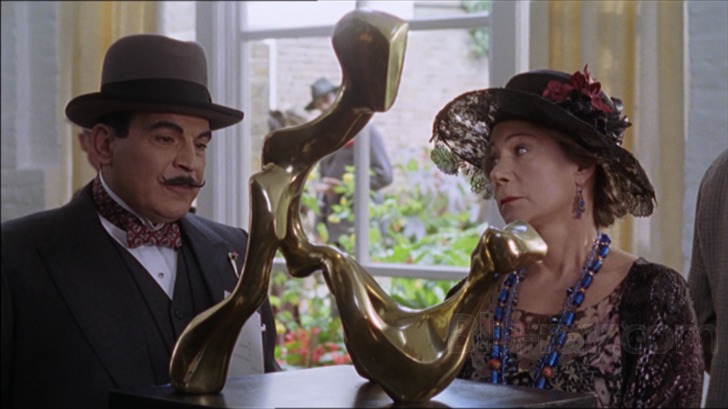
The Mystery of the Blue Train (disc 1) (first broadcast: Jan. 1, 2006, U.K.) The Mystery of the Blue Train was a novel over which Agatha Christie is known to have struggled, and it remained one of her least favorite. It seems only appropriate, then, that TV adapter Guy Andrew took major liberties with the plot for this special New Year's Day presentation, adding characters and subplots and expanding the scenery into the kind of extravaganza that required location shooting in France and major effects in post-production. The canvas became so big that even identifying the murder victim here would be unfair to first-time viewers, because there are several good candidates. Blue Train†could be described as the story of two young women who board Le Train Bleu from Calais to the French Riviera, and then, for contrived reasons, switch compartments. The first young woman is Katherine Grey (Georgina Rylance), an impoverished American who has just come into an unexpected inheritance. Poirot rescues Katherine at a restaurant prior to departure when she is befuddled by the waiter's ceremonial opening of a wine bottle and pouring of a sample to taste. They become friends, and she asks the genial Belgian to tutor her in the customs of gracious living, a commission that Poirot is only too pleased to accept. Katherine's distant and penniless relatives are already descending upon her in the person of the pretentious Lady Tamplin (Lindsay Duncan), her useless (and much younger) fourth husband Corky (Tom Harper) and her equally useless daughter Lenox (Alice Eve, most recently seen as Dr. Marcus in Star Trek: Into Darkness). The second young woman has always had money. Her name is Ruth (Jaime Murray, the crazed love interest in Season 2 of Dexter), and she is the daughter of American oil baron Rufus Van Aldin (Elliott Gould). Ruth has a feckless husband named Derek Ketterling (James D'Arcy) from whom she's running away and who refuses to give her a divorce, despite inducements offered by her father and his right-hand man, Major Knighton (Nicholas Farrell). Ruth also has a lover named La Roche (Oliver Milburn), who is a passenger on the Blue Train. And she is traveling with a fabulous ruby named "the Heart of Fire" that her indulgent father acquired specially for her; she and her maid, Ada Mason (Bronagh Gallagher), keep it under lock and key. It turns out that Katherine Grey and Ruth Van Aldin a/k/a Mrs. Ketterling have a connection. Years earlier, Ruth's wealthy father acquired the business of Katherine's father and ruined him in the process. When Katherine learns that Ruth is a Van Aldin, her entire expression darkens. The Van Aldins ruined her life, she tells Poirot. Also on the Blue Train is a mysterious Anglo-African woman of elegant attire and regal bearing, who says very little but has the air of someone well-informed (Josette Simon). Who she is, and why she is aboard, will remain unknown until late in the episode. Unlike the more famous Murder on the Orient Express, where Poirot's investigation remains on the train, this one happens after the Blue Train arrives at its destination, where Poirot has the assistance of a a local French policeman, Inspector Caux (Roger Lloyd-Pack). Poirot does mention, though, that he would very much like to ride the Orient Express someday. Cards on the Table (disc 1) (first broadcast: Mar. 19, 2006, U.K.) Poirot is accustomed to murderers who plan their crimes with care, but a victim who plans his own murder? That's something new. Poirot is invited to an unusual evening's entertainment by one of the world's wealthiest men, the mysterious and sinister Mr. Shaitana (played with insinuating theatricality by Alexander Siddig, best known as Dr. Julian Bashir on Star Trek: DS9). The guest list consists of four sleuths and four suspected killers. During dinner, Shaitana engages in a theoretical discussion of murder, dropping broad hints suggesting to one or more of the suspected killers that he knows their secret. Then he leads the sleuths and the suspects to card tables in separate rooms and leaves them to play bridge, while he relaxes by the fire and waits to see what happens. By the end of the evening, Shaitana is dead, quietly stabbed through the heart. It is up to Poirot and the three sleuths to identify the killer. Poirot's three companions are a colorful bunch. Supt. Wheeler (David Westhead) is a top cop at Scotland Yard, although he has a skeleton or two in his closet. Colonel Hughes (Robert Pugh) is in the Secret Service, although neither he nor his friend Poirot would ever say so. The fourth sleuth is an eccentric crime novelist named Ariadne Oliver (ZoŽ Wanamaker), who chatters incessantly and is full of outlandish theories. Mrs. Oliver is thought to be a satirical self-portrait of Christie herself, and she becomes a recurring character in the later Poirot stories. The four suspects are a jocular physician, Dr. Roberts (Alex Jennings); an explorer, Major Despard (Tristan Gemmill); a widow, Mrs. Lorrimar (Lesley Manville), who is an expert bridge player; and a shy young woman named Anne Meredith, who lives in the country (Ariadne Oliver calls her "a country mouse"). As the four investigators look into each of their backgrounds, suspicious circumstances are revealed. Each had left the bridge table during Shaitana's social event, providing an opportunity to stab him. But Poirot, true to his method, insists that psychology is the key to unraveling the killer's identity. Foyle's War star Honeysuckle Weeks appears as Rhoda Dawes, Anne Meredith's housemate and best friend since school, who may hold the key to her mysterious past (and maybe more than that). The adaptation by Nick Dear (who also wrote The Hollow and would write four future episodes of Poirot) makes several major changes to the novel, but the essential murder plot remains the same.

Poirot: Series 10 Blu-ray Movie, Video Quality 
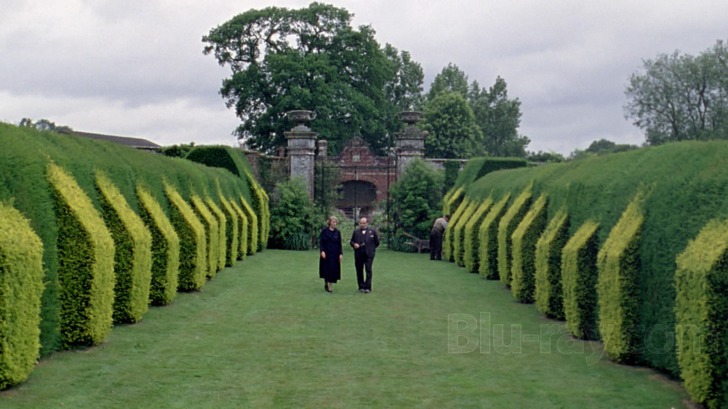
In what is a first in my experience of reviewing Poirot on Blu-ray, there is a noticeable variation among the quality of the episodes in Series 10. The difference may result from various shooting styles, given that each episode had a different director and cinematographer. None of the episodes look bad by any means, and certainly none of them exhibit the problems that plagued the whole of Series 7 & 8, but the variable quality was obvious in viewing these two 1080p, AVC-encoded Blu-rays. Cards on the Table is the weakest of the four, with the softest and least detailed image and noticeable grain. "Least detailed" in this context still means that the image has enough detail to allow appreciation of Mr. Shaitana's ornate residence, where the first half of the episode is set, and of the various suspects' homes and places of work, where subsequent interviews occur. The blacks of the gentlemen's evening wear are solid, and the colors are vibrant and saturated. The remaining three episodes in Series 10 are all significantly sharper and more detailed, with After the Funeral taking top honors, followed closely by Taken at the Flood and The Mystery of the Blue Train. All three have finely resolved images with little or no noise, lively and varied palettes, good blacks and well-adjusted contrast. On the whole, Series 10 maintains the standards sets by Acorn's early releases of Poirot, but ever since the show entered the era where the A&E Network acted as co-producer, the video quality of Acorn's releases cannot be assumed.
Poirot: Series 10 Blu-ray Movie, Audio Quality 
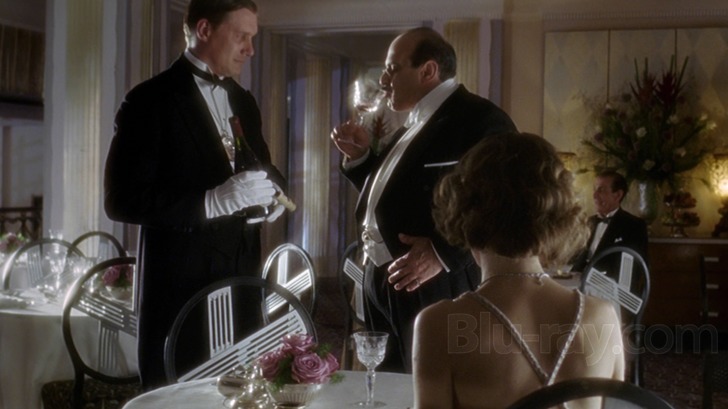
Lossless DTS-HD MA 2.0 remains Acorn Media's new audio standard for Poirot, and the stereo sound mixes for these four episodes are consistent with prior episodes under the new regime. Certain key sound effects (notably, the train engine, whistles and wheels in The Mystery of the Blue Train) are more prominent than the usual sound editing, but dialogue still has priority. With Series 10, scoring duties were taken over by Stephen McKeon (Primeval), who provided a more lush orchestral presence that at times recalls the elegiac tone of the late John Barry.
Poirot: Series 10 Blu-ray Movie, Special Features and Extras 
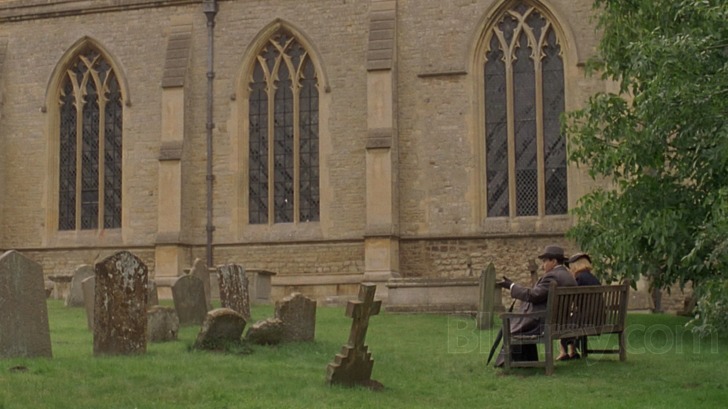
- Behind the Scenes (480i; 1.78:1, enhanced; 45:36): Narrated by Tony Wilson, this unusually detailed "making of" documentary features on-set footage from all four episodes in Series 10. It includes interviews with actor David Suchet, as well as numerous guest stars and various personnel behind the camera, including producer Trevor Hopkins. Caution: Spoilers galore.
- Photo Gallery (1080p; 2:31).
- Trailers: At startup, disc 1 plays the usual trailer for Acorn Media, plus a trailer for Dirk Gently.
Poirot: Series 10 Blu-ray Movie, Overall Score and Recommendation 
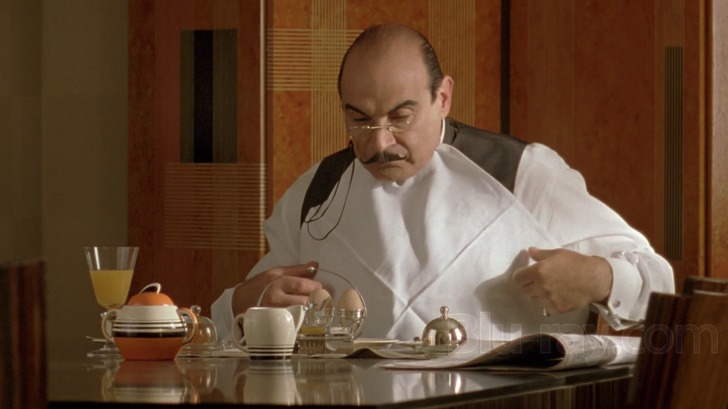
In the Behind the Scenes documentary for Series 10, David Suchet says that he enjoyed filming it more than any to date. Ironically, it contains some of the darkest tales and most evil villains to have appeared in Poirot so far. The great detective's revelations of the murderer have begun to take on an angrier tone. Since he could not manage to stay retired, Poirot's only option when confronted with the boundless human capacity for evil is condemn it. "If God should withhold His mercy from anyone on Earth, it surely will be you", he thunders at one killer he has exposed. For a brief moment, he sounds more like an Old Testament prophet than a detective. Highly recommended.
Other editions
Poirot: Other Seasons

Poirot: Series 1
1989

Poirot: Series 2
1990

Poirot: Series 3
1991

Poirot: Series 4
1992

Poirot: Series 5
1993

Poirot: Series 6
1995-1996

Poirot: Series 7 & 8
2000-2001

Poirot: Series 9
2003-2004

Agatha Christie's Death on the Nile
2004

Poirot: Series 11
2008-2009

Poirot: The Movie Collection - Set 6
2009-2010

Poirot: Murder on the Orient Express
2010

Poirot: Series 12
2010-2011

Poirot: Series 13
2013
Similar titles
Similar titles you might also like
(Still not reliable for this title)

The Mirror Crack'd
1980

State of Play
2009

Murdoch Mysteries: Season 18
The Artful Detective
2024-2025

Zodiac 4K
Theatrical 4K | Director's Cut BD only
2007

Foyle's War: Set 8
2014

The Night of the Generals
Limited Edition to 3000 - SOLD OUT
1967

Murder on the Orient Express 4K
50th Anniversary Edition
1974

Miss Marple: Volume 1
The Murder at the Vicarage / The Body in the Library / The Moving Finger / A Murder is Announced
1984-1986

The Raven
2012

Murder on the Orient Express
2017

Twisted
2004

The Black Dahlia
2006

Evil Under the Sun
1982

Gosford Park
Arrow Academy
2001

Crooked House
2017

The Girl with the Dragon Tattoo
2011

The Bone Collector 4K
1999

Murder by Decree 4K
1979

Taboo: Season One
2017

L.A. Confidential
1997
